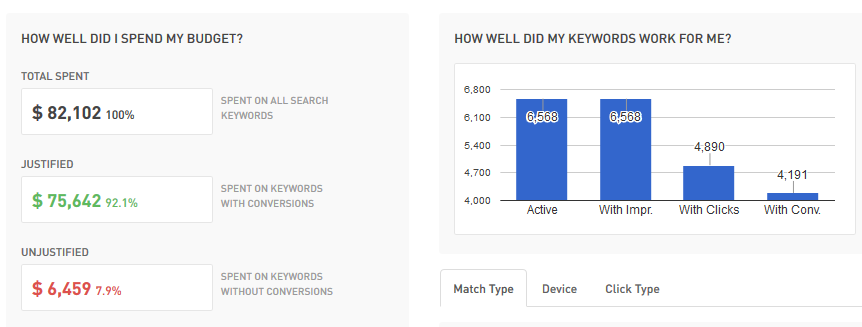There are 3 ways to win with search engine advertising. Considering it is an auction, against not just your competitors, but anyone trying to reach that audience, there is lots of room to give up hope and think PPC doesn’t work for you. As with any auction, you need an edge.
You need atleast one of these 3 ppc advantages to win.
1. Better Margins/Lower Operation Costs – In most auctions, the bid prices catch up to the margins. As long as someone is able to undercut you, they will outbid you. So, if you can find a way in your business to deliver goods or services at a lower cost to you that your competitors, you can afford outbid them. Unfortunately, this advantage is very rare unless you are extremely large like Walmart or Amazon, or you are very specialized, enabling you to fetch a higher rate, leading to a better margin.
2. Better Converting Website/ Better Converting Sales Team – if you can close more visitors into leads and/or more leads into paying customers, the value of each click increases above your competitor, enabling you to outbid them. This strategy goes a step further, if your competitors have poor tracking. For example, if your competitors aren’t tracking phone calls, they might only attribute form submissions to their ppc, and think the amount they can pay for a lead or click is lower than it actually is. (This is why Google just introduced free call tracking, and is heavily focused on better online to offline and multi screen attribution.)
The Problem With The Above Two Strategies Is…They Cost You More Money Than Your Competitors.
Yes, you can afford to win the auction, but what you really need is a way to beat your competitors, at a lower cost. This way, if something in the market changes, like your competitors find a way to produce the goods for less, you still have an edge. Of course, you want to optimize all three formulas to ensure ppc domination.
3. Better Quality Score – Leading To Cheaper Clicks – Loosely explained, Google doesn’t just want the highest bidder winning, they want it to be true to their native experience, which is finding the most relevant and credible results. So, Google devices a formula called Quality Score, which essentially is a ranking of 1-10 of how relevant your ad, keyword, and landing page match up to each other. There are different quality scores, and your existing quality scores influence new keywords you add to your campaign. There is much talk about it, and Google plays with the formula, but a good rule of thumb for optimizing Quality Score is to focus most of your energy on writing better ads. The name of the game in simplified terms is to generate a higher relative click through rate than everyone else in that same position. Google is obviously optimizing their formula to revenue, and they make more money when your ads get clicked more often.
In general, the key to optimizing Quality scores is to make sure you are grouping keywords together that are best represented by the ad shown, and supported by a strong message match with the landing page. Many people try to group their keywords by similar sounding, since having your keyword in the ad is easier, and is recommended by Google as a way to appear more relevant.
The Problem With This Strategy of Grouping Keywords Based on Similar Semantics is That It Doesn’t Match Search Intent.
In other words, just because the word sounds similar, and it is in the ad, might show an ad that makes no sense or is not targeting the actual intent of the searcher. This is where Tenscores comes into play.
Here is a quote from Chris at Tenscores,
“It takes all your keywords, compares them against each other and decides which ones deserve to be in the same ad group to share the same ads. Basically, it analyses search intent and recognizes keywords that are so similar in search intent that the same ad would work for them. This creates the best ad groups you can have. Other tools use semantics instead of search intent, which usually isn’t that great (and you often have to redo things several times before getting an acceptable result).”
Here are a few more highlights from the Tenscores QS tool.
– It works for any language.
– If you have any broad matched keywords, it will add modified broad and exact match variation.
– It will then give exact match the higher bid then modified a lower bid and broad the lowest to prevent match types from competing against each other.
– You can create single match type ad groups, a technique that some of our customers exclusively use and one that has proven to produce great results (we might make it the default in the future). It will add negative exact match keywords to phrase match ad groups, then negative exact and negative phrase to broad match ad groups to prevent match types from competing against each other.
– You have control over the settings.
All of the features mentioned above are awesome. I actually loaded a client account in there, and not only did it make recommendations, it automatically rebuilt my campaigns to focus on an increase in Quality Scores and deployed it to my account, pausing the old campaign. So far, it has increased my overall quality score by 0.4 and that is only in two days.
The tool also does all sorts of quick analysis on your account to see what you can do to improve your quality scores.
My favorite feature though is the Budget Analysis which can help me try to close new prospects or show how big of an impact my quality score optimization can make.
As you can see, If i ran this tool on a prospects account, I could easily tell them how much money they are wasting with their old vendor and have immediately actionable ways to improve them.
Of course, no tool out there yet can actually replace the need for writing amazing ads that compel clicks, although I have found a very interesting open source script on Github I hope to test out that basically runs a mock search results page to MTurk with your ad copy and lets you test your ad against others without paying expensive clicks to Google. (I can see this not working because the MTurk users is not in the same frame of mind as the actual searcher, but it can certainly help figure out what stands out on the page visually.
I hope this helps you drive better quality scores, cheaper clicks, and higher value lower cost customers.
Good Luck.


 Click Images To Verify
Click Images To Verify

For someone who hasn’t gone into PPC yet but fully intends to (I’m currently learning as much about it as humanly possible) this is a really good introduction into optimizing quality scores and your tips will be very useful. The ‘How Well Did I Spend My Budget’ tool would be my favourite feature too. It would probably help those who are getting disheartened and becoming prone to giving up, because they can see that while some things are a miss, others are actually working.
Hi Ethan, PPC is one of those things that can either make you a fortune, or destory your budget over night. Optimizing quality scores by keeping tightly themed ad group and writng ads with great message match and compelling copy will make all the difference. Most companies write ads once and let it run. There is always room for improvement though (unless you have a 100% CTR)